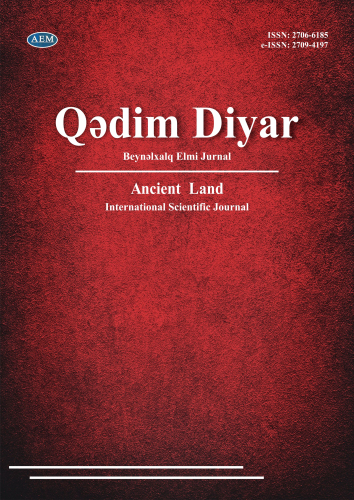DOI: https://doi.org/10.36719/2706-6185/22/16-21
Pərvin Qafarova
Azərbaycan Dövlət Pedaqoji Universiteti
pedaqogika üzrə fəlsəfə doktoru
ORCID ID0009-0002-9696-3540
ÜMUMTƏHSİL MƏKTƏB BİOLOGİYASININ TƏDRİSİNDƏ ŞAGİRDLƏRƏ
EKOLOJİ BİLİK VƏ BACARIQLARIN AŞILANMASI
Xülasə
Məqalədə ümumtəhsil məktəblərində biologiya fənninin tədrisində şagirdlərə ekoloji bilik və bacarıqların aşılanmasının imkanları araşdırılır. VI-XI sinif dərsliklərində problemin həlli imkanları siniflər üzrə verilir. Biologiyanın məzmun xətləri canlıların quruluşu və müxtəlifliyi, Bioloji proseslər, İnsan və onun sağlamlığı, Canlılar və ətraf mühit üzrə ekoloji bilik və bacarıqların aşılanması imkanları ümumiləşdirilir. Göstərilir ki, hər bir məzmun xəttinə dair mövzuların tədrisində ekoloji bilik və bacarıqların aşılanması imkanları mövcuddur. Lakin “Canlılar və ətraf mühit” məzmun xəttinin mövzularında imkanların daha geniş olduğu qeyd edilir. Məzmun xəttinin mövzuları üzrə imkanlar nümunələrlə izah edilir. Mövzuların tədrisində nəzərə alınacaq ekoloji bilik və bacarıqların aşılanması imkanları onlardan dərslərdə səmərəli istifadə olunmasını tələb edir və problemin aktuallığını təsdiq edir.
Tədqiqatda biologiya mövzularının ekoloji bilik və bacarıqların aşılanması imkanları baxımından onun tədrisi yolları müəyyən edilir, metodikası əsaslandırılır. Biologiyanın tədrisində ekoloji bilik və bacarıqların aşılanmasında müşahidə, müsahibə, tədqiqat, təqdimat, əqli hücum, müzakirə, eksperiment, təlim xarakterli oyunlar kimi metodların tətbiqi metodikası məsləhət görülür. Aşağı siniflərdə ekologiyaya dair sadə anlayışlar, problemləri şagirdlərin yaşadığı ərazinin ekoloji problemləri öyrədilir. Yuxarı siniflərdə isə şagirdlərin diqqəti daha ciddi, böyük, qlobal problemlərə cəlb edilir. Problemin həllinin ekoloji bilik və bacarıqların şagirdlərin vərdişlərinə, bioetik davranışlarına çevrilməsi baxımından yanaşılır. Ona görə də bu sahədə şagirdlərin müstəqil yaradıcı işlərinin: tədqiqat, təqdimat, esse, layihələrin hazırlanmasına daha geniş yer verilməsi mühüm hesab edilir. Şagird təqdimatlarına, slaydlarla işə daha çox yer verilməsi məsləhət bilinir. Biologiyanın tədrisində şagirdlərə müntəzəm ekoloji bilik və bacarıqların, davranışların aşılanması təlimin keyfiyyətini artırdığı, şagirdlərin ətraf mühitə bioetik münasibətinin yaxşılaşdığı, onların hər yerdə ekoloji mədəniyyət nümayiş etdirdiyi məlum olur. Bu isə nəinki ekoloji mühiti yaxşılaşdırır, həm də pozulmuş ekoloji tarazlığın bərpasına müvafiq töhfələrini verir. Ekoloji mədəniyyətə, bioetik davranışlara malik olan şagird yaşadığı ərazidə, evdə, həyətdə, məktəbdə, küçədə və digər ictimai yerlərdə ətraf mühitin, suyun, torpağın, havanın, canlıların təmizliyinə daim qayğıkeşliklə yanaşır. Onlar ekologiyanın qorunmasında və bərpasında məsuliyyətlərini dərk edir. Şüurlu olaraq ekologiyanı qoruyur, başqalarından da ətraf mühitə ziyan vurmamasını tələb edir. Eyni zamanda zərərli vərdişlərin insan orqanizmi ilə yanaşı ekologiyaya, ətraf mühitin çirklənməsinə, antropogen amillərin artmasına t.əsir göstərdiyini dərk edirlər.
Açar sözlər: ekologiya, biologiya, cansız təbiət, müşahidə, bitkilər, heyvanlar, ekoloji problem, dərslik
Parvin Gafarova
Azerbaijan State Pedagogical University
Doctor of Philosophy in Pedagogy
parvin.gafarova@gmail.com
ORCID ID 0009-0002-9696-3540
Imparting students the ecological knowledge and skills in teaching the biology
of the school providinggeneral education
Abstract
The article examines the possibilities of imparting environmental knowledge and skills to students in the teaching of biology in secondary schools. In VI-XI textbooks, problem solving opportunities are given by class. The content lines of biology summarize the possibilities of imparting ecological knowledge and skills on the structure and diversity of living things, Biological processes, Man and his health, Living things and the environment. It is shown that there are opportunities for inculcating environmental knowledge and skills in the teaching of subjects related to each content line. However, it is noted that the possibilities are wider in the topics of the "Animals and environment" content line. The possibilities for the topics of the content line are explained with examples. Possibilities of inculcating environmental knowledge and skills to be taken into account in the teaching of subjects require their effective use in lessons and confirm the relevance of the problem.
In the study, the ways of teaching biology are determined and its methodology is justified in terms of the possibilities of imparting environmental knowledge and skills. In the teaching of biology, the method of application of methods such as observation, interview, research, presentation, brainstorming, discussion, experiment, educational games is recommended for inculcating environmental knowledge and skills. In the lower classes, simple concepts of ecology, environmental problems of the area where the students live are taught. In the upper classes, students' attention is drawn to more serious, big, global problems. The solution to the problem is approached from the point of view of turning environmental knowledge and skills into students' habits and bioethical behavior. Therefore, it is considered important to give more space to the independent creative work of students in this field: research, presentation, essay, preparation of projects. It is recommended to give more space to student presentations, work with slides. In the teaching of biology, it is known that instilling regular environmental knowledge and skills and behaviors to students increases the quality of education, improves the bioethical attitude of students to the environment, and demonstrates ecological culture everywhere. This not only improves the ecological environment, but also contributes to the restoration of the disturbed ecological balance. A student with ecological culture and bioethical behavior always cares for the cleanliness of the environment, water, soil, air, and living things in his home, yard, school, street and other public places. They understand their responsibility in protecting and restoring the environment. Consciously protects the environment and requires others not to damage the environment. At the same time, they realize that harmful habits affect the ecology, environmental pollution, and the increase of anthropogenic factors along with the human body.
Keywords: ecology, biology, inanimate nature, observation, plants, animals, ecological problem, textbook

